The Rising Stars of 2024
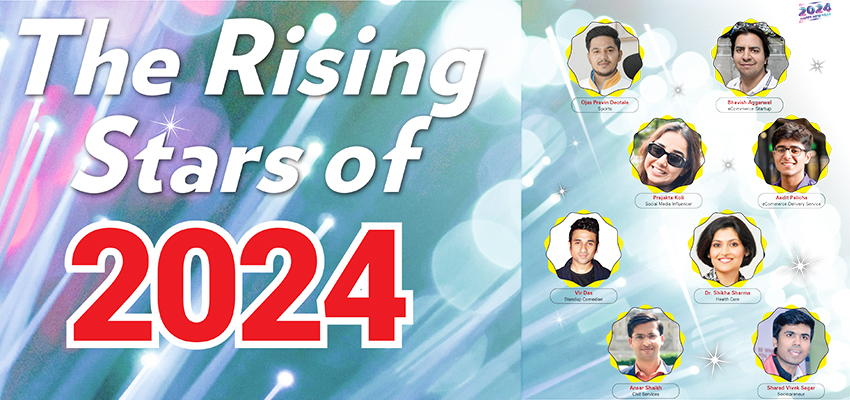
They may very well be the difference-maker, but what truly sets them apart is their exceptional driving force that is transforming the world. They are definitely the rising stars to watch for both in India as well as in the near future. Corporate Citizen recognize these young achievers who have impacted the industry with their current role, achievements, career goals and contributions to the industry they are in. They are at the top because they brought out their very best and are already having an outsized impact with their multidimensional approach. Let’s take a closer look to understand why they continue to make waves and catch attention
Ace of Archery
By Vinita Deshmukh & Anushree Bhoware
- Name : Ojas Deotale
- Sector : Sports
Ojas Pravin Deotale, created a sensation by clinching gold medals in the World Archery Championship, 2023 and Asian Games, 2022. His sterling career is a result of his relentless hardwork and humility. While he now aims to hit the bull’s eye in the next Olympics, Deotale delves into his inspiring journey
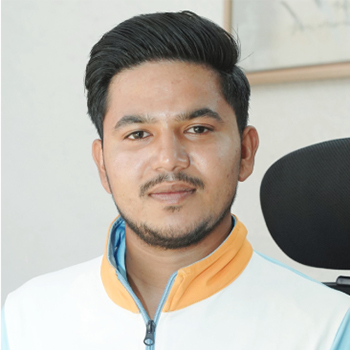
In the sport of archery, Ojas Pravin Deotale has carved an indelible mark, currently holding the prestigious ninth position in the global rankings. His ascent to international fame began on 5th August, 2023, when he clinched the gold medal in the men's individual compound event at the esteemed 2023 World Archery Championships in Berlin and at the Asian Games 2022—historic triumphs that solidify his standing as the first Indian male archer to achieve such a feat.
His remarkable journey reached its pinnacle at the 2023 World Archery Championships, where Deotale's strategic prowess and precision culminated in a flawless score of 150, securing victory in the finals against Lukasz Przybylski of Poland.
Deotale's prowess extends beyond individual victories. With his compound mixed team partner, Jyothi Surekha Vennam. They clinched gold at the 2023 Archery World Cup, triumphing in both Antalya in Turkey and Shanghai in China.
Ojas Deotale's journey is a testament to dedication and early ingenuity. Hailing from Nagpur, he initially exhibited an innate fascination with archery, fashioning makeshift bows and arrows by disassembling household brooms during his formative years. Deotale boasts an impressive average arrow score of 9.72 and a career-best world ranking of 9. Notable accomplishments include breaking the Junior World Record at the Indian Junior Team Trials in 2022 and making a striking debut on the senior India team in December of the same year.
Ojas Deotale’s inspiring story in his own words and why he is India’s Rising Star:
My school days
I was not good at studying; so to save myself from it, I took up sports. Earlier, my parents used to pressurise me to study, but later they realised that it was futile to convince me. I pursued different sports before archery, like skating, where I bagged a medal at the state level. I have a Limca Book of World Records as I skated from Kanyakumari to Nagpur; I was in 4th grade at that time. Later, I joined gymnastics and bagged a silver medal at the national level in the game.
Archery was the game I always loved, and my family background helped me turn it into a career. My father was a sharpshooter in his era. I also had a desire to shoot, but he would not give me a gun for practice as I was too young then. So I used to practice by making arrows from a broom, also known as ‘kharrata’, and that was quite fun.
In 2017, archery was introduced at the school summer camp, and I decided to try it. I enjoyed it, especially hitting the yellow target. I won an individual bronze medal and a team gold medal in archery while representing the school in the under-19 National Archery Competition in 2019. That's when I realised my passion for archery, and at that moment, I dreamt of representing India internationally.
"Without any practice, I played the game and won individual silver and the team gold medal. It was a special moment for me, as I played well despite the injury. I still remember that my coach was so happy that he cried"
-Ojas Deotale
The disappointment and hardship
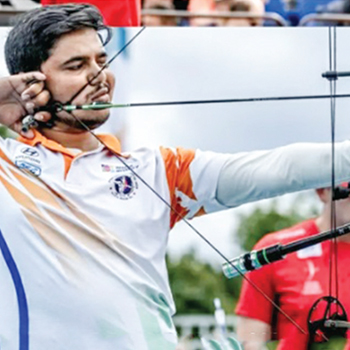
However, soon, I faced a tough time that lasted two years. I was not even able to make it to the state-level team. Many times, my relatives suggested that I should quit archery and pursue studies for a good life. But I told my parents that I don’t want to live a normal life with a typical 9-to-5 job. I wanted to create my own path. I initially intended to pursue hotel management for my higher education as my family thought I was wasting my time, but my mother believed in my uniqueness. She encouraged me to pursue something different; otherwise, today I might have ended up in the hospitality industry.
I also want to share an incident about my uncle, my father’s elder brother. The archery equipment is expensive and costs around Rs 5 lakh. As a beginner, I needed an investment of Rs 90,000 at that time. But my parents denied it. So I went directly to my uncle and told him about my plan, and he agreed immediately. Without his help, I would not have been able to pursue archery today.
The turning point of my life
I was training in my hometown, Nagpur, Maharashtra but the facilities were not up to mark.
So, one night I called my friend Prathamesh Phuge, who represented India in the international games earlier, and I decided to move to Satara to improve my skills. I planned the entire journey to Satara on the same night and informed my mother in the morning that I am going there for training with the renowned Coach Pravin Sawant and will return only after winning a medal. I assured her that if I don’t win a medal in a year, then I will return and pursue studies in the hospitality industry. My parents didn’t even know about my academy, but still, they let me go, and I went to Satara carrying my huge four bags.
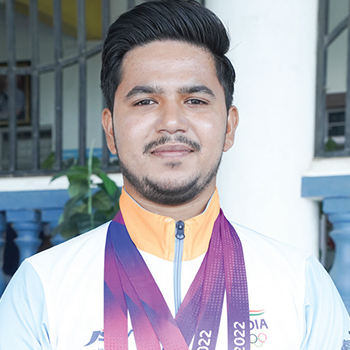
Coach Pravin came to pick me up at the railway station and said, “I have never welcomed any player like this before. You are the first one because I see an international player in you”. This statement struck me, and our interaction started. In Satara, the academy was on marshy farming land with a shooting range at a distance. Coach Pravin constructed separate rooms for us, and we 11 people, along with his family, stayed in this tin-roofed room. The training days were memorable there. One of the best memories was waiting for our turn to feel the breeze from a single table fan. Also, I practiced barefoot on the marshy land, which tuned me up well, although I had not informed my parents about these situations.
Now, after spending many months with him, he is more than just a 'Sir'; he is like my father now. We share a bond of father and son. I even celebrated Diwali with him. For me, my archery ground is my first home, and my Nagpur home is my second.
A challenging start
My first international debut was the Junior Asia Cup in December 2022. The story was supposed to go in another direction. We were training on the State Reserve Police Force (SRPF) ground in Pune for the international game. There I met with an accident and my foot suffered critical injuries. Despite immediate treatment, I had to be in four weeks of plaster, but I had match next week.
When I returned home, my parents supported me, encouraged me, and mentally prepared me to play. Hence, I removed my plaster within six days and I used a belt to secure my fractured foot; it was swollen and painful, almost appearing like an elephant foot. With this condition, I reached Sonipat Stadium, but due to my swollen foot, I was unable to wear shoes. And, according to a rule in archery, the toes of the player should be hidden while playing. So, the higher authorities decided to call in the fifth player.
Upon learning this, I removed my belt, the only support for the fractured foot. I bore extreme pain; it took me half an hour, but somehow I fitted my foot into the shoe. I limped back to the ground and got the green signal from the authorities.
My first international match was in Sharjah, UAE. Without any practice, I played the game and won individual silver and a team gold medal. It was a special moment for me, as I played well despite the injury. I still remember that my coach was so happy that he cried, saying he hadn’t seen a player like me. This debut led to more success; I was selected in the international Team-A, winning a gold medal in my first World Cup and another in Shanghai, China, with my teammate Jyoti Surekha. In my third World Cup , my pairing with Prathamesh Javkar and Abhishek Verma won a bronze medal. Then came the games in Berlin, where I skipped practice to enjoy the weather before competing.
The government supported us all through the World Athlete Championship. This championship was a significant opportunity for me. I was competing the top-ranking players, despite being ranked 300. I decided that even if I lose the match, I will not let top-ranked players win easily. Hence, I cleared the first three matches; I also won the quarterfinals with a score of 148 out of 150. In the semi-finals, I faced the world’s number one archer, Mike Schloesser, whom I titled Mr. Perfect. At first, I felt it was nearly impossible to beat him, so I switched my focus to the bronze medal. I just played the game with the aim of giving a tough fight. Hence, I scored 149 out of 150 while he scored 148. I succeeded in defeating the world’s number-one archer.
Lessons learnt at World Championship
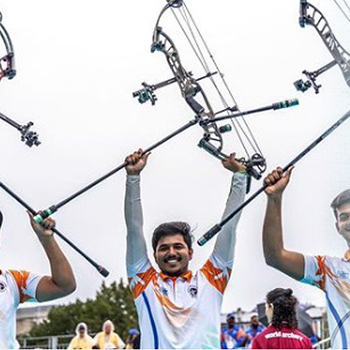
At the Archery World Championship, I saw many big athletes and learnt a lot from their lifestyles. We remained calm and focused on our performance. In the Indian team, I was the one who would have lots of fun and frolic, because of which my coach Sergio Pagni called me ‘Dancing Queen’. Before the game, my coach reminded me, saying, “You only have 52 seconds, and no one can take those 52 seconds away from you”. I recalled these lessons when I saw the tricolour flying up. I felt such immense pride that I started crying during the national anthem.
During the Archery World Cup 2023 in Paris, I suffered a severe back pain due to the soft hotel beds, which are not meant for athletes. Athletes need stiff beds to support their backs. Due to my severe back pain and soreness, I could not even move my head- it was very painful. My physiotherapist, Rajlakshmi, turned out to be my saviour and was there till the end-she gave me physiotherapy for two hours before the match using the taping techniques.
On the same day, the ranking round was to be held on 15th August—the Independence Day of India. That day, I just wanted our national flag, the tricolour, to be flying high. So, despite extreme pain, I played and secured the highest score of 713 on that day and the first rank. I forgot my pain on the ground.
The awesome Asian games
Then came the Asian Games. It was a fantastic experience for me as I participated for the first time. It is a very big platform for India. The set-up was great. One advantage of living together with the decorated athletes was that we, being first-timers at the Asian Games, learned how to tackle nervousness and panic, as they shared with us their experiences of participating in big events. Our coaches also gave us mental training, due to which we remained calm. They said that you have your bow with you, and your target is in front of you. Don’t look at the performance of your opponent. You have to only give your best performance. So we did not focus on our surroundings.
After the matches, my coach Pravin and foreign coach Sergio Pagni used to analyse my performance, and then we worked on reducing the mistakes. I set three records in the Asian Games—a 150 out of 150 with 7 Xs, a 149 out of 160, and a third record with our mixed team. This inspired me a lot; as a first- timer, this was a dream come true.
Coach Pravin was with me during the matches. I made a video call home when I reach the venue of the matches on the first day. During the call, my brother asked me to bring the third gold medal home as his birthday gift (which happened to be on that day). So I won these medals for India and as a birthday gift for my brother. I had made a video call home after winning the last individual gold medal. My mother was overjoyed to know that I had won the gold medal and had tears of joy.
Archery was the game I always loved, and my family background helped me turn it into a career. I used to practice by making arrows from a broom, also known as ‘kharrata’, and that was quite fun.
Gold Medal was life changer
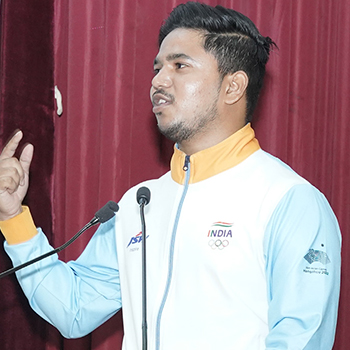
My life changed after winning the gold medal. I had the honour of meeting both President Draupadi Murmu and Prime Minister Narendra Modi, which was a momentous occasion for me. In India, we knew we would be given a grand welcome, but coming back to Nagpur was a complete surprise. There was a huge crowd. Everyone was chanting ‘Ojas… Ojas’. My future goal is to win medals at the 2028 Olympics.
I also want to share that I have experienced significant changes in my life by following insights of great speakers. It works wonders. Discipline is the key—a lesson I learned from them, which played an important role in my success. Learning discipline and patience got me success. Keep patience during tough times and simultaneously keep working hard. Love whatever you do in your life. When your Guru has made a decision for you, there is some reason to it, so listen to him and success will be yours.
I pursued archery with great passion, and it has become a life for me. I focused on archery than anything. I avoided socialising with family and friends to improve my game. I just want to say—be yourself, don’t copy others. You need to keep challenging your ego to reach this level. You can achieve anything when challenge your high ego.
Aiming for the sky
By Siddharth Gaikwad
- Name : Bhavish Aggarwal
- Sector : Startup
Coming from a small city and being born in a middle class family is no hindrance to being not only a successful entrepreneur but also one of the youngest billionaires in the country. This is truly exemplified by the success of the young entrepreneur, Bhavish Aggarwal, Co-founder and CEO, Ola. Corporate Citizen brings to you a brief of his life journey from his childhood in Ludhiana to setting up Ola Cabs, Ola Electric and so on till now
Humble beginnings
Bhavish Aggarwal was born in Ludhiana, Punjab whose first two years were spent in Kabul as his orthopaedic doctor father had gone there to treat the people injured in the Soviet-Afghan war. He failed in his first attempt of IIT entrance exam but later due to his strong determination and hard work secured 23rd rank and got into IIT Bombay in 2004 and went on to obtain his Bachelor’s degree in computer science and engineering in 2008. He started his career as an intern in the research team in Microsoft Research India in May 2007 and later became assistant researcher. In his two-year stint there, he filed two patents and published three research publications in international journals.
Adversity breeds innovation - Ola
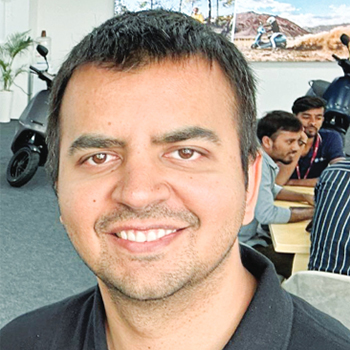
Bhavish first started an online site called Olatrip.com that offered holiday packages and weekend trips. He had to travel by rented car from Bengaluru to Bandipur as part of running this business. The cab driver on this journey demanded more fare to travel from Mysore to Bandipur. But Bhavish and his friends refused to pay the extra fare and continued their journey by bus. He realised that this is almost similar plight faced by millions of customers daily across the country who hire cabs for various purposes. At that time, different operators offered different prices for the same journey and fleeced the customers. Customers needed a reliable, quality cab service at reasonable prices.
Sensing a great business opportunity in this cab service business, he alongwith his fellow alumni Ankit Bhati founded Ola Cabs in December, 2010, in Mumbai. The name Ola is derived from the Spanish word ‘Hola’ which means ‘Hello’. Later Ola Cabs shifted its headquarters to Bengaluru in 2012. Within five years, Ola Cabs became Ola, a unicorn worth over $2 billion.
Phenomenal growth of Ola
Ola created its own app to provide quick cab service to the customers. Customers can book their cabs through the app. Ola does not own any cars. It partners with the cab drivers and owners who are provide services to customers as per their convenience. This allows the customers to book cabs at short notice through Ola’s app.
The smartphone and internet revolution in 2015 that began due to the availability of internet services at cheap rates powered the growth of Ola’s cab service throughout the country.
Now, Ola is India’s largest mobility platform and one of the world’s largest ride-hailing companies, serving 250+ cities across India, Australia, New Zealand, and the UK. The Ola app offers mobility solutions by connecting customers to drivers and a wide range of vehicles across bikes, auto-rickshaws, metered taxis, and cabs, enabling convenience and transparency for hundreds of millions of consumers and over 1.5 million driver-partners.
Ambition to end ICE age
He did not rest with just providing reliable and quick rides at reasonable prices. He wants to end ICE age in India which means ending the use of internal combustion engine (ICE) in two wheelers by increasing the usage of electric two wheelers thereby reducing pollution, conserving environment and reducing the ill-effects of impact of climate change. As a result, Ola Electric was established with a vision to manufacture electric two and four-wheelers, and popularise their usage in the country.
One of world’s largest R&D centre
To fulfill this ambition, Ola has set up one of the world’s largest and most advanced cell research and development centre – Battery Innovation Centre, at Bengaluru that houses over 500 engineers. It has also recently signed an MoU (Memorandum of Understanding) with the Tamil Nadu state government to expand its manufacturing abilities across two and four wheelers. It will set up an EV hub which will house advanced cell and vehicle manufacturing facilities, vendor and supply parks, and the largest ecosystem or EVs at a single location. It has developed the first indigenously developed lithium-ion (Li-ion) cell, NMC 2170. These cells are being used to manufacture rechargeable batteries for electric vehicles.
Our Parents generation fought for roti kapda makaan. Like it or not, our generation is destined to build India to the largest economy. It will take every effort. No better satisfaction than to contribute to this journey
Setting up India’s largest gig factory
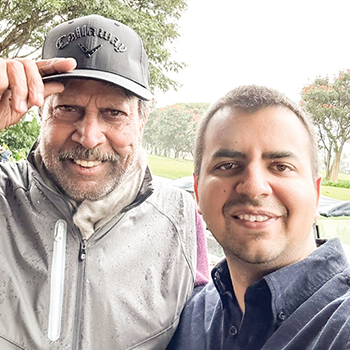
Further to fulfill this ambition, Ola has begun constructing India’s first and biggest gigafactory, to manufacture rechargeable batteries for electric vehicles (EV), on 500 acres land near Hosur in Tamil Nadu’s Krishnagiri district in June 2023 having a total cost of Rs 2,400 crore. Its operations are expected to begin by early next year with an initial capacity of five giggawatt-hours (GWh) which will be further expanded in phases to 100 GWh at full capacity, making it one of the world’s largest cell manufacturing facilities.
Ola website has claimed that it will be the largest all-women factory in the world having over 10,000 women working there. Also its total annual production capacity will be 10 lakh four-wheelers, one crore two-wheelers and 100 GWh batteries.
It has started selling Ola S1X, Ola S1 Air and Ola S1 Pro EV scooters. In October 2023, Ola Electric became the first ever company in India to sell more than two lakh electric scooters in within 10 months (as per Vahan data) of 2023. Ola Roadster, Ola Cruiser, Ola Adventure and Ola Diamondhead are to be launched in 2023 and 2024. It plans to also launch electric cars in future.
Foray into AI business
He has founded a new company, Krutrim SI Designs. Sources suggest that this new company will help in developing and support the operations of Ola Electric. It is raising $ 50 to 100 million from investors. In a recent interview he has said that the new company will focus on creating silicon chips, a cloud infrastructure to deliver solutions to customers, and AI models. It aims to develop an AI chat app.
Strong belief in India becoming largest economy
Expressing his strong belief in India becoming the largest economy, an upbeat Aggarwal had posted on 27 October 2023 on X, “Our Grandparents generation fought for independence. Our Parents generation fought for roti kapda makaan. Like it or not, our generation is destined to build India to the largest economy. It will take every effort. No better satisfaction than to contribute to this journey.”
Supports Murthy’s 70 hour/week proposal
Infosys co-founder NR Narayana Murthy had urged India’s youth to work 70 hours per week to contribute to nation’s growth. This statement had triggered a heated debate on social media wherein some supporting and others criticizing it. Supporting Murthy, Bhavish had posted on X, “Totally agree with Mr Murthy’s views. Rather it’s our moment to go all in and build in 1 generation what other countries have built over many generations.”
Awards and recognition
He received the 'Innovation in Transportation Award' from Frost and Sullivan in 2014. He was included in Time magazine’s 100 Most Influential People of 2018. He has also received the ‘mBillionth award South Asia 2013’ and HATT awards. He has also been listed in ‘30 under 30’ by Forbes.
Family and personal life
His sibling name is Ankush Aggarwal, who is founder of Avail Finance and who is currently working as Chief Business Officer, Ola Electric. Bhavish enjoys playing squash, cycling and owns a photography blog. His favourite book includes ‘Biography of Steve Jobs’.
Love for animals
He is an avid cynophile. There are more than 20 rescued stray dogs in the gig factory called as Future Factory at Hosur. He regularly meets and plays with these canines at the factory. In July 2023, he had introduced through X, Ola Electric’s newest employee, an adopted stray dog named Bijlee.
The laughs have landed, and how!
By Kalyani Sardesai
- Name : Vir Das
- Sector : Standup Comedian
With the international Emmy for his Netflix comedy special, Vir Das: Landing, his star is unambiguously on the rise. While this marks Vir’s second international Emmy nomination, (he’s loved in India and abroad alike!), he’s the first Indian comedian to achieve this feat. In his own words, “I have a simple rule—funny is funny. When I write comedy, it isn’t my aim to upset people. I will be offensive, edgy, and immature, but I will also be intelligent and relevant. At my shows, there are no holy cows.” In the same vein he has added: “I do not make fun of children and people who can fight back. That is my limitation.” A closer look at his career graph
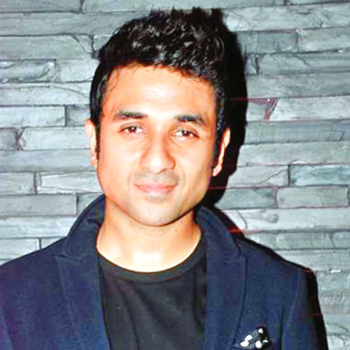
Actor-comedian Vir Das was stopped by a security official at Bengaluru airport and asked if his international Emmy had a sharp point. “I told him, it’s trophy’s wings,” he said. The official asked him what he does for a living and Vir replied he was a comedian. “You get awards for jokes?” the surprised official asked. “Even I am surprised, sir,” he replied.
Then life rewards you most people would make grand acceptance speeches, but not him. And it’s precisely this self- deprecating humour that makes him who he is: a comedian, a conscience, a voice that refuses to be silenced. His critics might carp he makes fun of India abroad, but those that have closely watched his work know he makes fun of everyone—no holds barred. “There are plenty of things about you America that I don’t understand, such as your women,” he said in a show. “I mean, how on earth can you resist this?” (Pointing to himself!)
Politicians of all hues have received the brunt of his scathing take. “Trump is America’s arranged marriage,” he said to a western audience hysterical with laughter. “He’s pretty much the guy your parents chose for you—so there!”
However, as he has constantly pointed out: “Whether you are in India or abroad, everyone expects an authentic Indian story.” A challenge given that there already exists a version put out by the successful Indian diaspora outside—so he better come up with a take that is refreshing and unique. And he doesn’t disappoint.
Sample what he says of Gen Z for instance. “Here’s why I think your generation might save the world. You have zero emotional retention. You must articulate every experience mid-experience and receive validation before you have completed the experience,” he said.
And how about this? “Someday, social media might wake up to the fact that other people’s failures are not your successes.”
Cutting, incisive and insightful by turn, his humour never runs out of steam. No easy achievement among a people famously questioned for lacking a funny bone. “To me, the trick is not how I can make people laugh. It is, how can I make people laugh in a different way,” he has said.
The comic timing is backed by a solid work ethic—as demonstrated by the fact he did not allow a technical snag to get in the way of his recent show in Bengaluru—fans thanked him for not walking out like South African comedian Trevor Noah. To which he replied on X, “India. We may grumble, we may take a second, but we always get the job done.”
The early years
Born in Dehradun Vir Das was raised in Nigeria and India. While he studied at the Indian Language School in Lagos, Nigeria, in India he went to The Lawrence School, Sanawar and Delhi Public School, Noida. Next, he obtained a bachelor’s degree from Knox College, Illionis in Economics and Theatre. After graduating from Knox, he went to Harvard University and Moscow Arts Theatre’s joint Stanislavasky Programme. He has often said that while he was an average student, the combination of economics and theatre, opened up a whole new dimension of thought for him, an entire new world view.
"Pretty much anyone with a sharp brain and a mic can become a comedian, but there’s a need to move beyond it. People wish to witness a marriage of theatre, comedy and something more"
On starting off
“I was pretty young when I started off,” he recounts his journey. “Being a comedian is like being pretty much the only person in the room who sees the ghost. You are on the lookout for other people who can see it too.”
In the early aughts, they did amateur nights for audiences, he says. From the ticketing to marketing they did it all—pretty much every comedian of note has come from it,” he says.
However, he is conscious of the need to keep evolving. As he has been quoted: “Pretty much anyone with a sharp brain and a mic can become a comedian, but there’s a need to move beyond it. People wish to witness a marriage of theatre, comedy and something more.”
What the Emmy means to him
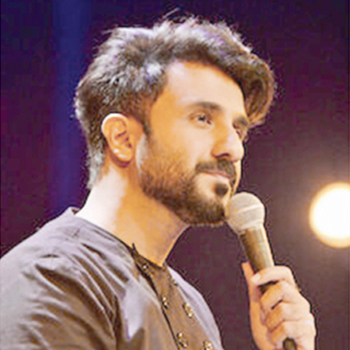
Expressing his joy and happiness at winning the Emmy, Vir said: “This moment is truly surreal—an incredible honour that feels like a dream. Winning an Emmy for Vir Das: Landing, in the category of comedy is not just a milestone for me but for Indian comedy as a whole. It’s heartening to see Vir Das: Landing resonate globally thanks to Netflix. My journey from crafting local stories to receiving a global accolade has been both challenging and rewarding, and Netflix has been instrumental in that growth. I’m excited about the continued explorations of diverse narratives, from Noida to the International Emmys: India gets you there.”
The winning moment was clearly more surreal for the fact that he lost the first time around to a massive show called Call My Agent. “This time too, I was against the massive Netflix show Derry Girls. So, I guess I was the underdog who got thrown in there,” he has said.
While it’s clearly a big moment for him, there was a time, not to long back, when he was labelled a traitor for making fun of India. This is how he views the experience. “All’s well that ends well and the best end for it must be a joke. I am in a profession where the best day in your life and the worst day of your life have pretty much the same outcome—they’re going to become a joke. Wait for my jokes on the Emmy moment as well,” he says.
On his acting career
In the days to come, he has big plans for his comedy company Weirdass Comedy, even as he assures followers that he wants to act some more plus co-direct a feature film. For those who came in late, he had shifted gears to Bollywood movies and went on to feature in movies like Delhi Belly, Go Goa Gone and Badmash Company among others. Thus far, his oeuvre consists of eighteen films—and counting. Says he: “I just wrapped up a series with Amazon, so it’s been a year of acting. I’ll be more visible on screen here on. But the projects have to be really good because otherwise I love stand-up. If I am going to take three months on an acting goal, then it must justify the time taken,” he rounds off.
Bringing Brilliance to Doorsteps
By Ekta Katti
- Name : Aadit Palicha
- Sector : Delivery service
Aadit Palicha's charming gaze, sculpted physique, Harry Potter-esque glasses and boy-next-door appeal might give off the impression that he's about to star in a Karan Johar next movie. However, this co-founder of Zepto, a quick grocery delivery app, is India's youngest billionaire and an entrepreneur to watch out for. In the expansive universe of opportunities, this rising star has crafted his constellation
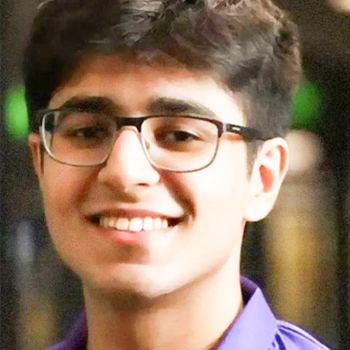
If you search for Aadit Palicha on Google, you'll find many questions about whether he's a billionaire, what his salary is, and details about his net worth. But if you take a quick look at his age, you'll be surprised – he's only 21 years age. In today's world, youngsters too can become billionaires through hard work and dedication. According to the 2022 IIFL Wealth Hurun India Rich List, Aadit's net worth is 1,200 crores. In the modern era, Generation Z has the potential to surpass their wildest dreams.
Considering he's only 21, his Instagram page doesn't reflect a typical teenager's lifestyle. Instead, it showcases his remarkable dedication and hard work. With over 5 posts, every one of them revolves around his brand and work. It's something everyone can draw inspiration from. It appears he's not only dedicated to his work but also a bit reserved and rather shy. He recently posted on a social media portal, "Taking a page out of my friend's book and shaking off my social media shyness." Surprisingly, the post was still about his work and nothing about his personal life.
A blockbuster beginning
Aadit was born in Mumbai, but his early years took a turn when his parents, relocated to Dubai. Completing his schooling there, Aadit earned a degree in International Baccalaureate (IB) with a focus on Mathematics and Computer Science from GEMS Education. This marked the beginning of his aspirations to achieve something significant.
Throughout his high school years, Aadit not only excelled in academics but also honed diverse skills. He emerged as a proficient public speaker, a dedicated sports enthusiast and an aspiring entrepreneur. If you check his video interviews online, you'll quickly realise how composed and mature he is for his age. While most youngsters were preoccupied with typical teenage activities, Aadit was busy dreaming big—so big that he aimed to pursue higher education at a prestigious institution like Stanford.
The co-founders of Zepto, Aadit and Kaivalya Vohra, are a true testament to friendship. These two have been childhood friends since the tender age of 12-13. They were bonded by their shared passion for building products. Little did they know that this was just the beginning and by the time they entered their early 20s, they would become billionaires. Their journey exemplifies the power of enduring friendship and shared dreams turning into remarkable success.
Oh, no Stanford!
For many, gaining admission in the Stanford University and pursuing their dream course is a pivotal moment in life. Two teens, Kaivalya and Aadit, shared this common aspiration, forging a bond that epitomises true friendship. Looking back, it becomes evident that all their shared experiences were leading up to a significant milestone.
However, things took a different turn. The outbreak of the pandemic in 2020 was challenging for everyone, but these two youngsters turned adversity into opportunity. Aadit and Kaivalya found themselves confined to the four walls of their house in Mumbai during the pandemic. While neighbours grappled with the issue of 'how to do grocery shopping,' these two focused on a solution. Recognising a gap in the market, as online grocery companies weren't accommodating bulk orders, they seized the moment and history was in the making.
Despite securing a spot in Stanford for the Computer Science programme, flying restrictions thwarted their dreams. Opting for a gap year, a decision that initially upset their parents, wasn't a lack of consideration for their future. Aadit had a well-thought-out plan to make it big somehow.
The magic of Zepto is our ability to consistently deliver 2,500+ products in 10 minutes flat. It's the core of what we do, and the reason why we’ve been able to grow so fast with phenomenal customer love
Boys with a plan
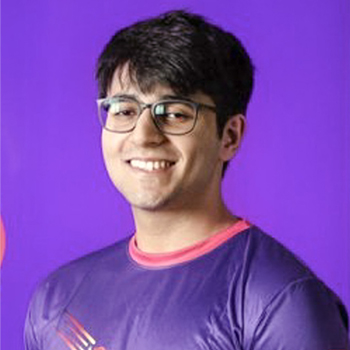
Soon, their concept materialised into the app KiranaKart, revolutionising instant grocery delivery, and it eventually caught the attention of Y Combinator, an American technology startup accelerator.
Their innovative approach gained momentum, proving to be a lifeline for their neighbours. Delivering grocery items within just 45 minutes during the Covid era was a remarkable feat. Time was of the essence, and they believed the delivery time limit should be set at a minimum of 10 minutes. This vision gave rise to Zepto and from there on, the possibilities became limitless.
In an online interview, Aadit revealed that they were handling hundreds of orders per day. The success they achieved prompted them to make the bold decision to drop out of Stanford. When the outcome is as beautiful as this, leaving college becomes an obvious choice. The duo were serious about their business, demonstrating that they were not just dreamers but individuals with a well- thought-out plan.
In early 2023, Zepto successfully secured $200 million in new funding, propelling its valuation to an impressive $1.4 billion.
What sets them apart
When you prioritise time, everyone benefits. The magical ability to produce over 2,500 items in just 10 minutes is what sets Zepto apart. In one of their online job postings, they elaborated on why someone should choose to work with Zepto, emphasising that this unique capability is at the heart of their success. "The magic of Zepto is our ability to consistently deliver 2,500+ products in 10 minutes flat. It's the core of what we do, and the reason why we’ve been able to grow so fast with phenomenal customer love. Our mission is simple: to make 10-minute delivery the new normal." And, in 2023, Zepto became the first Indian Unicorn.
Stars in true sense
The kids aimed for the moon but landed on a bright star. Typically, a star's light takes millions of years to reach Earth. Drawing an analogy from that, Aadit and Kaivalya took only a few years to shine on Earth. From childhood friends to the founders of Zepto, they have shown the value of hard work, resilience, unnoticed details, and the power of young minds. Their story embodies the spirit of Generation Z, proving that age is no barrier to achieving remarkable success.
The success story of Zepto will undoubtedly linger in our hearts for years to come, serving as an inspiration. Observing their journey, we all have much to learn, and we can breathe a sigh of relief, knowing that our country's youngest, without a doubt, will make India proud—indeed, they already are.
Never Give Up
By Rajesh Rao
- Name : Ansar Shaikh
- Sector : Civil Services
There's a popular saying that goes, “Hard work beats talent when talent doesn't work hard,” a quote attributed to Tim Notke, a high school basketball coach. This is especially true with Indian Administrative Service (IAS) Topper, Ansar Shaikh, who cleared the Union Public Service Commission (UPSC) 2016 exam in his very first attempt, despite facing many hurdles, but never giving up and he was just 21 years of age when he secured All India Rank (AIR) 361. He is currently serving as Sub-Divisional Officer (SDO) at Dinhata, Cooch Behar in West Bengal
“Heroes are made by the paths they choose, not the power they are graced with.”
-Brodi Ashton
On the path of growth and success, Ansar Shaikh, applied certain principles that allowed him to achieve success in his educational journey. He was on the path of success, but as a person how was he different in his thinking and act, which helped him grow and achieve what he dreamed of? Based on his own experiences, Ansar says, “Never give up and you can achieve anything in life.” He insists to keep this idea in front of oneself on a regular basis and apply the same consistently to enjoy phenomenal results.
Coming from a zero background
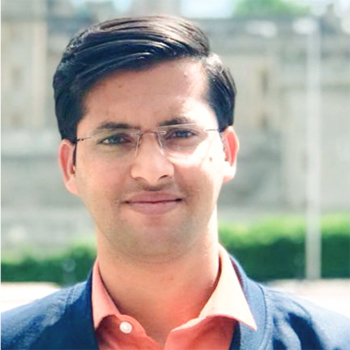
Ansar is a native from Shedgaon, a village in Jalna district, in the Marathwada region of Maharashtra. His father, Yonus Shaikh Ahmad, was an autorickshaw driver and his mother worked in the agriculture fields. His younger brother, Anees dropped out of school in standard VII and worked in a garage to support the family and help his brother prepare for the IAS exam.
To achieve his IAS dream, Ansar says that he worked for 10-12 hours a day consistently for three years. He had secured 91 per cent in his 10th class Secondary School Certificate (SSC) board exam. He has a degree in political science from Fergusson College, Pune, wherein he secured 73 percent in his graduation.
Despite coming from a remote underdeveloped region and a poor economic background, Ansar was adamant to achieve his goal and dream of topping the IAS exam and joining the cadre of Indian Administrative Service. He is currently assigned as Sub-Divisional Officer (SDO) at Dinhata, Cooch Behar in West Bengal.
Success secrets
Ansar strongly insists on understanding yourself and your capabilities while preparing for the UPSC and MPSC exams. “For success in UPSC and MPSC you need to study 10-12 hours every day, you need inbuilt smartness, need to work hard, study with dedication and focus—all these factors matter a lot for your success. Understanding yourself and your capabilities is most important,” he said.
The most important factor to prepare for any exam, Ansar says is to focus on two things, “One is revision and second is practice writing the dummy test papers available. I had jotted down enough micro notes and had done many revisions till I came to know it by heart. Regular revisions are really required. So, studying at micro level and regular revision is very important. Write as many practice papers as possible,” he said.
Toughest competitive exams in India
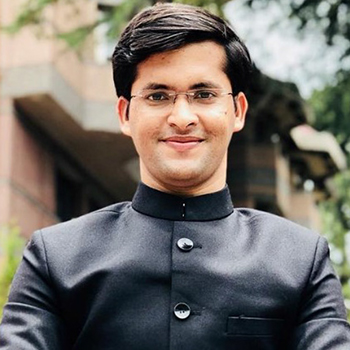
IAS Ansar Shaikh became the youngest to crack the UPSC CSE exam at the age of 21 on his first attempt in 2016. Considered as one of the toughest competitive exams in India, attempted by around 5 lakh candidates each year, the Civil Services Examination (CSE) is a national competitive examination in India conducted by the Union Public Service Commission for recruitment to higher Civil Services of the Government of India, including the Indian Administrative Service, Indian Foreign Service, and Indian Police Service.
It is also referred to as the UPSC examination and UPSC CSE. The exam is conducted in three phases: a preliminary examination consisting of two objective-type papers and a main examination, finally followed by a personality test (interview).
A successful candidate sits for 32 hours of examination during the complete process spanning around one year.
What matters is your determination and hard work
However, success for Ansar came after a lot of hardship. He says that though the environment he grew up was not conducive enough, he does not blame it. With resolute determination he says that what matters is your determination and hard work. However, he attributed his success to his family and friends who played a big role in his success. Ansar was a brilliant student from his school days and also did well in his SSC and HSC board exams.
Till his class 12, Ansar studied in Marathi-medium. He pursued his Bachelor’s degree in Political Science from Fergusson College in Pune, Maharashtra. Though it was financially demanding, Ansar was supported by in big way by his brother, Anees. It was during his studying at Fergusson College, he was first guided to appear for the UPSC exam.
Inspiration for thousands
A source of hope and inspiration for thousands of UPSC aspirants, today Ansar Shaikh, extends his helping hand to many such aspirants, answering their queries through his accounts on the social media platform like Facebook and Instagram.
Power of purpose
By Anushree Bhoware and Siddharth Gaikwad
- Name : Sharad Vivek Sagar
- Sector : Sociopreneur
Education is the only virtue which propels a person to succeed in life, irrespective of gender, religion, financial condition and other barriers. This is illustrated through the life journey of Sharad Vivek Sagar, founder and CEO, Dexterity Global, who is a globally renowned social entrepreneur, noted thought leader, powerful orator and a widely followed youth icon. Corporate Citizen brings to you his life journey from a small village in Bihar to obtaining scholarships for his higher education from reputed global universities and now coaching thousands of students from low- income families and marginalised communities to obtain scholarships from reputed global universities for excelling in life
Power of knowledge
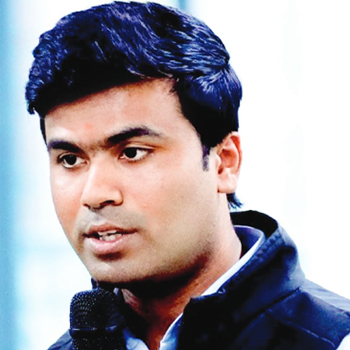
Sharad Sagar was born in a small village of Ziradei in Bihar, a village that lacks good education facilities. The young Sharad always had a thirst for knowledge. This passion led him to redefine education and leadership for millions of young Indians. Except for formal training in Korean martial arts, he was home- schooled by his parents until he was 12 years old. His father worked in a bank and was transferred to various places during this period, while his mother was a housewife. In an interview, he mentioned, “My parents were not rich or extremely well educated, but they had a vision for the future. They always used to say that your education should become the means of strengthening society.”
Living in the remote area of Bihar, Sagar would get newspapers a day late. But still, he read about national and international competitions and global universities published those in newspapers. He would write down these opportunities in a notebook. He was 12 when he enrolled in school for the first time through a scholarship. After getting enrolled, he began participating in all these competitions. By the time he completed high school, he had won over 200 local, national and international competitions. Not only this, he also represented India in over six different countries.
Sagar always wanted to redefine education, shattering the old structures with major constraints like access to information and access to training. When he represented India on global platforms, he realised that if India was to be built stronger and transformed for the future, it would have to be built bottom-up, and children at its grassroots should be prepared to be future leaders.
In 2008, at the age of 16, Sagar founded Dexterity Global to power the next generation of leaders through educational opportunities and training. Working on these initiatives, he also earned the title of Vivekanand of the 21st century.
Educational transformation
Sharad's strong desire for learning led him to the US, where he graduated from Tufts University in Medford, Massachusetts, with a degree in International Relations. His accomplishments at Tufts, including winning Tufts’ $100,000 Entrepreneurship Challenge, set the stage for a series of accolades. He was awarded with Paul and Elizabeth Montle Prize, the Wendell Phillips Award for oratory and leadership and the Samuel Huntington Public Service Award in 2016.
He was the only Indian to be invited by US President, Barack Obama, to the White House for a special gathering of young leaders in 2016. In the same year, he was one of the invitees at the Nobel Peace Prize ceremony.
His commitment to bringing about change took him to the University of Cambridge. He got selected under the Queen’s Young Leaders Programme in 2017-18, where he completed the year-long Programme on Leading Change of University of Cambridge. Within one year of his graduation in January 2018, he was awarded the university’s Young Alumni Achievement Award, making him the youngest recipient in its 160-year history. “It is not just a hard work that takes you from A to B, you need to know what opportunities are there for you,” said Sagar while addressing the gathering at Harvard.
The series of accolades didn’t end here. He received the highest Harvard Graduate School of Education (HGSE) grant and the prestigious KC Mahindra Scholarship to pursue his Master's Degree at the Harvard Graduate School of Education. Here, he became the first Indian to be elected President of Student Government at HGSE in 2021 by defeating eight other candidates. He was elected by over 1,200 students coming from more than 50 countries.
At Harvard, he served as the Team Manager of Harvard Hockey for the 2021–22 season. He is a member of the 1920 Society, which recognises the Harvard Graduate School of Education’s most committed supporters.
It is not just a hard work that takes you from A to B, you need to know what opportunities are there for you
Overcoming hardships
When Sagar was climbing the ladder of success, a set of events shattered him—he last his mother and his elder brother, Basant Sagar. Despite personal hardships, he took inspiration from his family. He says, “A number of times in life, life will punch you in the face, but do not be bothered by that.”
His parents had three children, comprising of two sons and one daughter. His elder brother Basant Sagar was 15 years old when he got selected as a student astronaut by NASA, 18 years old when he received a full scholarship from MIT, and in college when he was invited by US Presidents, George Bush and Barack Obama.
The joy of giving
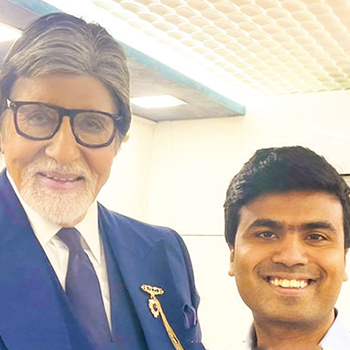
Sharad's commitment to transforming education became real with Dexterity Global, which now connects over 7 million young citizens in remote Indian towns and villages with educational opportunities (like competitions, conferences, scholarships, workshops, etc.) every month. Dexterity Global inspires and enables India’s young generation to redefine education and become leaders.
Through leadership and career development programmes, Dexterity alumni have become national and international champions, UN Ambassadors, and creators of initiatives that have received over `114 crores in scholarships. More than 80 per cent of these children come from low-income families and marginalised communities.
Dexterity Global believes that India can grow only when its young citizens have access to educational opportunities, are trained as servant leaders and emerge as local role models. “Very often we sit back, thinking good things will happen, knowing that good things take time and hoping that someone else will do it. The world needs you. Change needs you,” said Sharad while addressing students at the Tufts University Graduation ceremony.
Orator
As a firebrand orator and thought leader, Sharad reaches over 5 million people monthly on social media. His impactful speeches have taken him to prestigious stages globally. He is a sought-after speaker at universities and organisations. He has been invited to speak at over 250 major stages across 20+ states in an average year.
The sky is the limit
Sagar’s continuous efforts have earned him on Forbes' Global 30 Under 30 list and the Rockefeller Foundation's list of 100 Next Century Innovators. He says, “My story is not just my story; it's our story— the great Indian story—the story of all things being possible no matter who you are, where you were born, and what your parents did; the story of your hard work and dreams and merit dictating your destiny, not your inheritance or zip code or family income.”
Michigan State University has put him on its Social Entrepreneurship syllabus; the Government of Taiwan has quoted him on their Social Impact Agenda; while the Ramakrishna Math and Mission has featured him on their annual calendar.
In 2022, Dainik Jagran bestowed upon Sagar the Editor’s Choice Award for India’s Youth Icon, for representing the bold face of young India and redefining education and leadership for millions of young Indians. He has been invited as the youngest speaker on the popular TV show, Kaun Banega Crorepati. He addressed the closing ceremony of the Y20 Summit under India's G20 Presidency as its chief guest in August 2023.
Sharad Sagar said once, “Change takes time. But it also takes people”. He is on a mission to power the next generation of leaders, proving that the dedication of an individual can indeed transform the path of a nation.
From Radio Dreams to Bollywood Screen
By Anushree Bhoware
- Name : Prajakta Koli
- Sector : Social Media Influencer
In her early years as a child, Prajakta Koli was always passionate about sharing her creativity, which led her to discover her passion for radio. At the age of 9, she decided to become a radio jockey. However, she had no idea that life had different plans for her. Today, she is winning the love of people as a YouTuber and social media influencer, which she may not have found in her earlier dream. Prajakta's journey from a young girl who dreamed of a radio career to a versatile social media influencer showcases that if you have the passion, you will definitely find the right direction. Through her unpretentious humour, she is breaking barriers and gaining global recognition. She has become a role model for aspiring creators in India. Here's what her journey has been like

Prajakta was raised in a healthy environment by her parents, Manoj Koli, a real estate businessman turned restaurateur and Archana Koli, a language teacher, who encouraged her to chase her dreams. She went to Vasant Vihar High School in Thane. In a YouTube video, she talked about her school memories, “My only memory of waking up early during school days is on the first day of the new academic year and on the day of the school picnic.” Prajakta also mentioned, “One exciting thing during school days was meeting friends after a three-month- long summer vacation. Unlike today's kids with phones and the internet, we didn't have anything, so we could only meet by visiting each other's houses. We mostly met at school. I used to hang out with my friend Shivanjali outside of school, but the most exciting thing was meeting all our school friends after the vacation.”
An average student academically, it was during her school days that Prajakta developed a fondness for creative pursuits by actively participating in various cultural activities. Later, she pursued a Bachelor of Mass Media degree at V. G. Vaze College of Arts, Science and Commerce, Mumbai.
Dreams and expectations
After completing her educational journey, Prajakta knew about her next step. She immediately joined Mumbai’s Fever 104 FM (FM radio station) as an intern. This career break was taking her closer to fulfilling her dreams. A year later, she got the opportunity to host her own show, Call Centre. She worked hard on it, but destiny had other plans. The show did not meet expectations and things were not working out well.
During her show, she also met Sudeep Lahiri, Vice President - Content and Strategies, One Digital Entertainment. He recognised the sense of humour and talent she had and encouraged her to explore the world of YouTube and social media content creation. She followed his advice and with a heavy heart chose to resign from the radio station.
Prajakta never expected that she would be joining a completely new media industry, which will help her unleash her creativity and connect with a broader audience. This was the point at which Prajakta's YouTube career began to take off.
From her humble beginnings to becoming one of India's leading influencers, she has won the hearts of millions of people across India and the globe
From an RJ to a YouTuber
Prajakta began her career as a YouTuber in February 2015. Her first video was titled Five Types of Singles on Valentine’s Day. It quickly gained internet traffic of 1.1 million, which is more than 10 lakh views for a single video. With her humorous and relatable content, she gained followers on social media like wildfire. Today, she has 7.9 million subscribers on YouTube, 7.9 million followers on Instagram, 1.2 million followers on Facebook, and 405.6K followers on X (Twitter).
Prajakta creates videos under various playlists, like #Real Talk Tuesday and #Sawaal Saturday, in which she shares her life moments. She also interviews celebrities and fellow creators and curate’s playlists like “The Montu Playlist” and “The Family Playlist".
Calling beyond YouTube
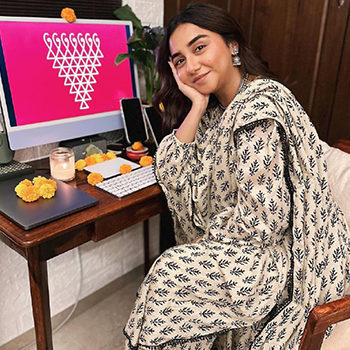
Prajakta’s talent did not limit her to YouTube; her influence extended beyond YouTube. She made her first Bollywood debut in the year 2022 with Dharma Production's “Jug Jugg Jeeyo." Before her Bollywood debut, she was part of short movies like ‘Khayali Pulao’ (2020) and the Netflix series ‘Mismatched’ (2020–2022).
All her performances on the big screen were praised by both critics and audiences. Her most recent movie was Neeyat, released in 2023, in which she portrayed the character of Gigi. Prajakta has also completed the writing of a contemporary romance novel, Too Good to Be True, which will be published in the summer of 2024.
From her humble beginnings to becoming one of India's leading influencers, she has won the hearts of millions of people across India and the globe.
Accolades and achievements
Prajakta’s significant contributions in the digital space have not been overlooked. She has been acknowledged by Delhi Chief Minister Arvind Kejriwal, on International Women’s Day for addressing women’s issues. She has received different awards, including the CSR Journal’s Influencing Youth Icon Award 2022, the Creator of the Year title award in the OTT play Changemakers Awards 2023, the Most Stylish Digital Entertainer (Female) Award, and the Daytime Emmy Award for Creators for Change in Girls' Education Special, among others.
Journey to the UNDP
Prajakta’s influence has reached beyond the entertainment industry. The United Nations Development Programme (UNDP)-India recently titled her the first UNDP-India Youth Climate Champion. Following the same, she has also launched the social initiative #iPledgeToBeMe, which addresses the issue of body shaming. Under this initiative, she also performed in a powerful music video titled "Shameless", which has garnered over two million views on the internet.
Standing tall
With her passion and perseverance, Prajakta has inspired many content creators. Being an average student with dreams of becoming a radio jockey to a social media star signifies that following your passion will always take you to an unexpected path. Prajakta Koli stands tall as a rising star, leaving a lasting impact on millions of hearts.
Synergising tech-driven regenerative healing
By Sangeeta Ghosh Dastidar
- Name : Dr Shikha Sharma
- Sector : Healthcare
Dr. Shikha Sharma, Founder, Nutriwel Health (India) Pvt. Ltd., is seen as a pioneer who conceptualised Nutrigenetics, a science that helps to understand why some individuals respond differently than others to the same nutrients. She has combined modern medicine techniques and the principles of Ayurveda with nutrigenetics. She devised her vision of a diet and holistic health management business via the telemedicine model concept, much before it became a new ‘normal’ in the post-Covid world
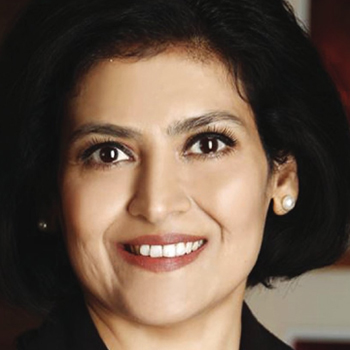
As a medical professional, Shikha Sharma, has since triggered several changes over the years, in the wellness, diet and lifestyle management sector across multiple verticals. A well-known practitioner, she consults celebrities and has been gaining mileage through her virtual presence across social media platforms.
Shikha gained accolades much earlier on in her life starting with the Hall of Fame Award bestowed by her alma mater, Modern School, Vasant Vihar. The laurels kept building up as a recipient of the Women Achiever Award by FICCI, the Gr8 Indian Women Award, and the Women Achiever Award by the Bharat Nirman Society. She received an award from Ghulam Nabi Azad, former Union Health Minister of India, for her services in preventive healthcare. She has been listed as one of the ‘Top 50 Young Achievers’, by the India Today Group. She was awarded the Aspen Global Leaders Fellowship (India Batch 3) and is a Fellow of the BMW Young Leaders, a non-profit foundation run by the German auto major, BMW. Shikha served as the National Health Chair for Young Indians, a subsidiary of the Confederation of Indian Industry (CII).
The early days
Shikha Sharma’s family hails from Srinagar and they settled in Delhi when she was very young. She completed her schooling at Modern School Vasant Vihar and armed herself with an MBBS degree from the Maulana Azad Medical College (1987-1992), New Delhi. Shikha has recently garnered much popularity as a social media healthcare influencer and has been steering her branded platform ‘One Health’, offering comprehensive health and diet management programmes. Much before embarking on her journey as an entrepreneur, her role as a junior cardiac doctor led her to realise that most critical patients (ICU-bound), had no idea about the root cause of their ailment and often relapsed into unhealthy eating patterns post-treatment. While her medical curriculum did not emphasise critical aspects of nutrition, she knew that it was the base for preventive healthcare management.
It prompted her to set up her first venture in 2012 - Nutri Health, a professional and scientific preventive healthcare system. Despite a few initial failures, Nutri Health, mobilised ayurvedic doctors and nutritionists, in managing various individual patient programmes. Nutri Health has now transitioned into Nutriwel Health (India) Pvt. Ltd.(2022), addressing four verticals – Nutrition Advisory, Nutrition Software, Herbal Products, and Online Education. Shikha’s vision has been to create a one-stop shop nationwide for all nutrition-related advisory and research requirements.
A challenging start
Shikha displayed her entrepreneurial acumen at an early age, especially after completing her MBBS degree. Although she was clear about starting a healthcare-led venture, she was unsure about the business specifics. She therefore resumed her journey as a junior doctor at Delhi’s Govind Ballabh Pant Hospital. As a junior cardiologist, she initiated nutrition advice to her patients which did not have many takers in those days. She had to deal with a mindset that did not understand the preventive concept of healing. Shikha nevertheless attempted to set up her first venture in 1995, which unfortunately failed to take off. Her stoic disposition stood the test of time. Undeterred, she tried once again to establish her entity in 1998, which yielded results, as she re-packaged her advisory service as weight-loss consultation solutions. In due course, she pioneered nutrition consultation as a business model, setting up a chain of nutrition clinics across Delhi.
The turning points
Shikha established her first South Delhi brick- and-mortar clinic in 2000, which by 2008, grew to seven more clinics across Delhi’s NCR, introducing ayurvedic ‘Panchakarma’ and product sales across these centres. In the initial stages, scaling up her clinics without compromising on the quality of service was a challenge. She remained unfazed and tuned into the possibility of a tele nutrition centre (akin to a telemedicine centre). She envisioned the Asset light Tele-nutrition scope in 2008, an idea much before telemedicine became another new normal, in the pre-Covid days.
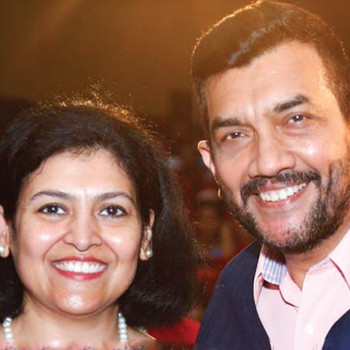
She devised a call centre model (Tele Nutrition Centre), initiating the Nutrition CRM project with third-party technology developers. She leveraged technology without any prior technology know- how. She also understood her lack of hiring tech- savvy individuals. Thus, began her self-learning journey. She taught herself the basics, which transformed her brick-and-mortar establishment into a tele nutrition call centre, which was her ‘eureka’ moment. It snowballed into a successful process of building a centralised digital marketing- cum-client servicing module. The idea laid the foundation of her very first venture, NutriHealth Systems in 2012. It became the stepping stone that consolidated and dispensed healthcare and nutrition across electronic platforms, gaining more virtual space over the years for a wider audience. She crafted her skills from working individually to building a band of intellectuals in impacting treatment, and knowledge dissemination. The model enables patients to work towards their health goals as part of a wellness team.
In 2016, they received Rs 12 crore in Series A funding from the Singapore-based OneHealth Ventures, and Shikha rebranded her services under ‘Dr. Shikha’s NutriHealth'. The funding helped develop technology, enabling her team to deliver services via voice, video and a dedicated app. Thus, a clinician’s brick-and-mortar establishment transitioned to a platform-based model. In 2016, NutriHealth serviced 50,000+ customers, managing 2,00,000 calls monthly. They would attract an active 3,500 client base who subscribed to their three, six, or 12-month services at any given point. NutriHealth's mobile app, YuWow, enabled 85% customer engagement. In due course, the nutrition counselling services, transitioned into smart connected devices and their quest to explore new opportunities continued.
Around 2016-17, NutriHealth's revenue grew from Rs 12 lakh annually to Rs 10 crore (trending). Dr. Shikha’s belief in women's empowerment encouraged a strong service team of all-women nutritionists and doctors. The external funding resulted in an almost 75 % growth. In March 2019, the company’s second round of funding raised another INR 12 crores, which was utilised to strengthen its technology and business teams.
The journey continues
Between 2015-2018, their in-house technology team, from pedigree colleges built the Amikus CRM and Master Diet Engine, which streamlined nutrition counselling with increased scope for personalisation. Around October 2020, they introduced a nutrition software tool, enabling professionals to create highly personalised and scientific nutrition plans based on a repository of clinical knowledge, a stage that allowed integration of modern and traditional systems of nutrition and herbs. It was around Feb 2021, when their interactive video streaming platform, Digital Health introduced a dedicated information platform, imparting health and wellness-related news.
Yet another leap
Over the years, Shikha struggled to understand various aspects of Ayurvedic and Unani nutrition, including Chinese medicine-led nutrition. She absorbed all her learnings and with her team of western medical nutritionists and ayurvedic doctors, put together a protocol called Vedique Nutrition. Her belief stemmed from her experiences in the learning and re-learning process, which reaffirmed the need for career guidance in channelling one’s talent and inherent qualities. The thought buoyed her vision to start the Unitus Health Academy, an online platform for natural health sciences, that blends different health sciences under one umbrella, providing upskilling opportunities to health professionals. The online platform allows global access to students in fulfilling their commitments in the healthcare and nutrition sector.
According to Shikha, nutrition science touches the soul and is critical throughout the various stages of the human lifecycle. “Nutrition Science has given me all that I value and cherish - the love of my patients and the popularity that I have gained in society”, she said.